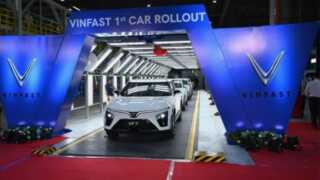By WAF Think Tank
THOOTHUKUDI, India | Vietnamese automaker VinFast has officially commenced production at its first manufacturing plant in India, marking the rollout of the very first car from the facility located in Thoothukudi, Tamil Nadu. The project represents the initial phase of a larger US $2 billion investment strategy, with US $500 million committed over the first five years.
Spread across 400 acres within the SIPCOT industrial park, the plant is VinFast’s third globally and its first outside Vietnam. The facility is currently assembling two premium electric SUV models, the VF 7 and VF 6, tailored for the Indian market in right-hand drive configuration. Production began with a capacity of 50,000 units per year, expandable to 150,000 units based on demand.
VinFast Asia CEO Pham Sanh Chau confirmed that the company plans to start rolling out vehicles to Indian showrooms later in August 2025, though exact pricing and launch dates remain undisclosed.
Anuj Guglani, CEO, World Auto Forum commented, ‘VinFast’s rollout marks a historic milestone—not only as India’s first locally manufactured VinFast car but also as a signal of its global ambitions taking shape. As the electric vehicles roll out of Thoothukudi and into Indian driveways, the future of EV mobility in South Asia is entering a new era.’
Expansion, Exports & Local Ecosystem
The plant is expected to create over 3,000 direct jobs along with several thousand more indirectly via the supply chain, supporting Tamil Nadu’s emergence as a major EV manufacturing hub . VinFast CEO Chau and Tamil Nadu’s Industries Minister T.R.B. Raaja highlighted the location’s strategic advantage: a skilled workforce, strong infrastructure, and proximity to a major port—ideal for serving domestic markets and exporting outward.
Orders have already come in from neighbouring countries like Sri Lanka, Nepal, and Mauritius, signaling the plant’s role as a future export hub for Southeast Asia, the Middle East, and Africa.
Market Strategy & Challenges
VinFast’s entry into India aligns with its global pivot toward Asian markets following limited success in Western countries. The company aims to reach a global sales target of 200,000 vehicles in 2025, with the Indian plant expected to contribute significantly.
Over the past year, many international automakers—including Tata Motors, Mahindra, Hyundai, and MG—have already established strong EV footprints in India. Experts say VinFast must win consumer trust through competitive pricing, robust service networks, and localized supply chains to compete effectively in this price-sensitive and fiercely competitive market.
VinFast has taken steps toward a full-fledged EV ecosystem in India, forging partnerships with local firms such as RoadGrid, myTVS, Global Assure, and BatX Energies to support charging infrastructure, battery recycling, after-sales service, and extended dealership coverage across the country .
Looking Forward
As VinFast begins delivery of the first India-assembled VF 7 and VF 6 SUVs, the journey ahead hinges on its ability to localize sourcing, build consumer trust, and differentiate itself from entrenched competitors. If successful, the Thoothukudi plant could grow into a key export hub of the region and a pillar in India’s broader EV ambitions.
Source: worldautoforum.com





